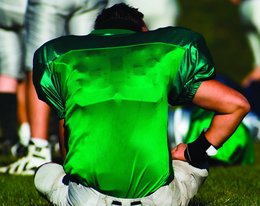
Summer is long gone, and the sound of bats striking balls on Little League fields has been replaced by the sound of linebackers hitting running backs on area football fields.
But it all is a striking reminder that youth sports are more popular than ever. Even so, with the numbers of young people participating estimated in the tens of thousands, the trend of overzealous parents—and even some coaches and administrators—is on the rise and having a negative effect on the games kids play.
One highly publicized example of a parent possibly crossing the line occurred at North Penn High School early this year when a group of parents, led by Eric Stephens, complained that basketball coach Ron Hassler was not giving their sons enough playing time.
When the parents cited racial discrimination as the reason the five black players were not getting enough playing time, the story caught the attention of not only several area newspapers but also television and radio stations.
Reports suggested that the parents wanted Hassler to start and give more playing time to their sons and, at one point, Stephens filed a complaint with the NAACP and threatened to sue the school district; Stephens said he was worried his son’s of lack of playing time would hurt his chances for a scholarship.
The situation eventually faded from the headlines as Hassler received support from the school district administration.
“In today’s families, children more than ever are the priority,” Cimmet says. “With parents driving their children back and forth to various activities, they have become very invested in their kids. … [Parents] see [their kids] as an attachment of themselves and become almost their ‘representative.’ ”
Although this has always been true to some degree, according to Cimmet, years ago there were not as many extracurricular activities and the avenues they can provide.
“With all the benefits that come out of youth sports, like the chance for scholarships, parents are advocating so strongly for their children and losing sight of actual facts,” Cimmet says. “Sometimes, rather than letting children find out about disappointment for themselves and grow through that experience, parents are looking for someone to blame because we also live in such a reactive society.”
A related problem Cimmet sees is young people “internalizing” their parents’ behaviors. Essentially, children are becoming their parents, looking for someone to blame if things are not going their way on the field.
Cimmet’s simple advice to both athletes and parents alike is that it is OK to fail.
“Sports is a microcosm of society, and quite frankly, life isn’t always fair,” he says. “A kid who is always shielded from his shortcomings will be blindsided by disappointments in the real world if they don’t learn these lessons early. … Things like getting job promotions are not always fair and other similar situations.”
He believes getting kids acclimated to failure, and teaching them how to deal with it, is akin to being exposed to germs: “It’s about building up your immune system for later in life. Children who don’t are less equipped to deal with those realities.”
He also advises parents to look at the long-term development of their kids and not so much the winning and losing.
“I try to get them to go deeper into their values and examine what they really want for their kids,” he says. “Look at what their hopes and dreams are.”
Cimmet also encourages parents to let their children deal with their coaches directly if they feel there is a problem instead of making a big fuss.
“What I’d rather see [young athletes] do is let them be advocates for themselves and learn from that process.”
For the athletes themselves, Cimmet often uses hypnosis and imagery to help them “stay in the zone” and keep their minds focused on the task at hand and not negative pressures.
“I’ll have them imagine they are a superhero or maybe an animal,” he says. “When you are playing sports, your mind needs to be focused on what you are doing. You have to know how to rebound from a mistake. … There is no time to analyze while you are playing.”
“Sports provide a needed balance, and they ‘wake up’ our body’s awareness of physical activities,” he says. “We are made up of so much more than our minds; it’s important to keep our bodies healthy and excited, especially when our country is dealing with a near epidemic of obesity.
“Sports help us work on accomplishing physical goals that are just as important as academic ones. You need a balance and you need to have fun in school. That fun shouldn’t be squeezed out by coaches or parents.”
For more information about Dr. Gerald Cimmet, visit RevitalizationCenter.com.
R.P. Webster is a freelance writer based in Doylestown.


